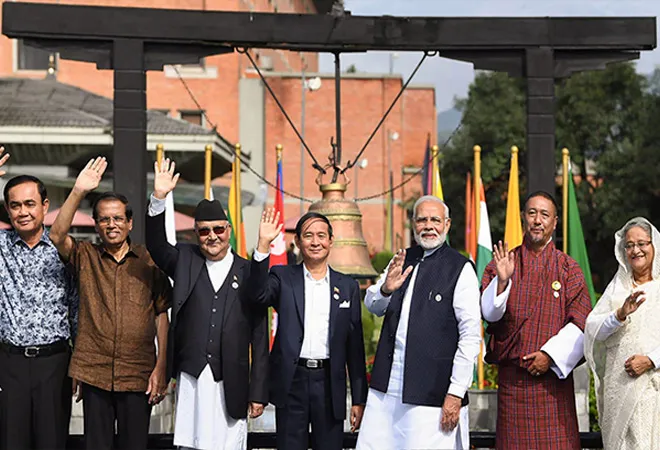
This article is part of the series — BIMSTEC in 2021.
Observers have long noted that the Indian Ocean region is less organised than other regions around the world. It has only a handful of pan-regional political or security groupings. For many years, cooperation among Indian Ocean states has often been focused at the sub-regional level, including through groupings such as ASEAN (Association of South East Asian Nations), SAARC (South Asian Association for Regional Cooperation) and GCC (Gulf Cooperation Council).
At their best, all-inclusive multilateral regional groupings have the potential to achieve significant benefits, including promoting trade, developing a cohesive regional voice, helping maintain regional stability, and potentially even helping their members resist undue influence from extra-regional powers.
In recent years, India has given greater focus to BIMSTEC, in part because of frustrations over SAARC.
BIMSTEC is among the youngest of these groupings. Formed in 1997 under the co-sponsorship of India and Thailand, the grouping has the potential to coordinate cooperation among Bay of Bengal countries in a variety of areas of common interest. India initially shied away from allowing security-related issues to be placed on the grouping’s agenda. But in recent years, India has given greater focus to BIMSTEC, in part because of frustrations over SAARC. Delhi hoped that without the presence of Pakistan, BIMSTEC could emerge as a more effective vehicle for regional cooperation. Some observers called it India’s ‘Saarc minus one’ approach that would emerge as its default neighbourhood policy. A greater focus on BIMSTEC would also be consistent with Delhi’s turn towards India’s eastern neighbours as part of an enhanced Act East Policy.
But, in many ways, BIMSTEC has so far failed to live up to the hopes of its members. There are several reasons for this, but one of the most significant has been the deterioration of the relationship between two key member states — Bangladesh and Myanmar — over the ethnic cleansing of the Rohingyas by Myanmar’s security forces.
In many ways, BIMSTEC has so far failed to live up to the hopes of its members.
BIMSTEC is not the only sub-regional multilateral grouping in the Indian Ocean region that has been hamstrung by internal divisions. SAARC has become paralysed by India-Pakistan rivalry. The GCC has been largely inoperative since 2017 when Saudi Arabia and other members cut political and economic ties with Qatar. The venerable ASEAN grouping has also been deeply damaged by the South China Sea dispute — where China has divided Cambodia and Laos against the ‘maritime’ states such as Vietnam, the Philippines, Malaysia and Indonesia. The split among ASEAN states over this dispute has led some to doubt its future as an effective organisation.
Several lessons can be drawn from this. It is too easy to imagine that formalising a group of countries into a multilateral organisation with a constitution and a secretariat will give it substance. Often the opposite is the case. All-inclusive regional groupings that rely on consensus decision-making can all too easily be divided and paralysed by internal disputes or outside powers. Groupings that at one time sounded like a good idea can easily drift into inefficiency and immobility.
All-inclusive regional groupings that rely on consensus decision-making can all too easily be divided and paralysed by internal disputes or outside powers.
One alternative to formal multilateral regional groupings are so-called ‘coalitions of the willing.’ These have become increasingly popular in recent years to provide forums for capable and willing states to meet and discuss shared interests with the aim of finding areas for cooperation or coordination of responses to specific issues. There are several examples of these so-called ‘minilateral’ groupings involving Indian Ocean states. The recently revived India-Maldives-Sri Lanka maritime security trilateral could provide a useful platform for cooperation between those countries. The Australia-India-Indonesia trilateral has been meeting at a senior official level since 2017 to focus on shared concerns in the maritime domain. It has recently been elevated to foreign minister level, with an expanded agenda, including trade and cybersecurity. In September 2020, the foreign secretaries of India, France and Australia also recently met with a full agenda of shared concerns in the Indo-Pacific.
Informal plurilateral groupings of this sort may lack some of the benefits that formal agreements and standing secretariats can provide; for example, a degree of continuity and/or formal recognition in the international system. But they can more than make up for this with flexibility, agility and effectiveness — and in some cases — some useful ambiguity. Such groupings allow countries to formulate coordinated responses on issues without being bound by bureaucracy or formality. Leaders can spend their time discussing issues of substance rather than drafting formal resolutions.
If Bangladesh and Myanmar can mend relations, the grouping can play a valuable role in facilitating cooperation in the region on a whole range of issues.
Many of these minilateral groupings involve large and middle powers with significant capabilities. But there is no reason why similar coalitions cannot emerge that bring together less powerful countries in and around the Bay of Bengal. Such non-inclusive groupings can help regional states skirt ‘roadblocks’ to cooperation and reduce opportunities for powerful extra-regional states to throw ners into the works.
This is not to say at all that Bay of Bengal states should give up on BIMSTEC. If Bangladesh and Myanmar can mend relations, the grouping can play a valuable role in facilitating cooperation in the region on a whole range of issues. But in the meantime, Bay of Bengal countries, large and small, may need to find alternative ways of working together.
The views expressed above belong to the author(s). ORF research and analyses now available on Telegram! Click here to access our curated content — blogs, longforms and interviews.




 PREV
PREV


